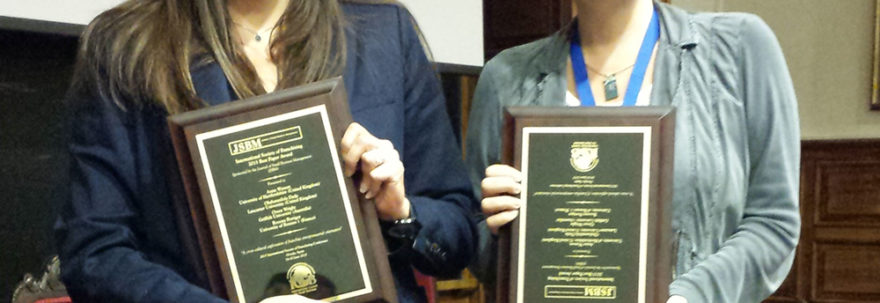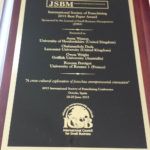Dr. Rozenn Perrigot – Associate Professor qualified to supervise research and Director of the Center in Franchising, Retail & Service Chains at IGR-IAE Rennes, Researcher at CREM-CNRS – and Dr. Anna Watson – Reader in Marketing at the University of Hertfordshire in the United Kingdom and member of the Center in Franchising, Retail & Service Chains – received the Best Paper Award at the International Society of Franchising conference on June 20, 2015 in Oviedo, Spain. Their article – co-written with Lola Dada (Lancaster University – United Kingdom) and Owen Wright (Griffith University – Australia) is entitled “A Cross‐Cultural Exploration of Franchise Entrepreneurial Orientation”. The summary of this research is available below:
Research suggests that there are cross-cultural variations in entrepreneurial entry rates (Autio et al., 2013) and it seems that this in part stems from differences in cultural values. Hayton et al (2002) argue that differences in cultural values may mean that the extent to which entrepreneurial behaviours, such as risk taking and independent thinking are considered desirable will differ between cultures. Thus, it is suggested that some cultures will be more closely aligned with an entrepreneurial orientation (EO) than others (Mueller and Thomas, 2000). Studies exploring the impact of culture on entrepreneurship have considered this at a number of levels, from looking at aggregate measures of entrepreneurial activity, such as innovation and rates of new firm formation, individual entrepreneurial personality characteristics, and corporate entrepreneurship. However, as Hayton et al. (2002) highlight there is a paucity of studies which consider this latter level, corporate entrepreneurship. It is, therefore, this last form of entrepreneurship which this paper explores, in examining whether national culture (as measured by Hofstede’s dimensions of uncertainty avoidance, individualism-collectivism, power tolerance and masculinity-femininity) influences the entrepreneurial orientation exhibited by franchise organisations. It does so by exploring the level of entrepreneurial orientation exhibited by 376 franchise organisations in their promotional rhetoric in five different country contexts (Australia, France, India, South Africa and the UK), using the computer assisted content analysis software DICTION. Franchise organisations are an interesting context in which to explore entrepreneurial orientation, given the apparent contradiction between the autonomy which may be granted to franchisees versus the uniformity and standardisation which franchise systems are often seen to represent. The results found that culture has an important influence on entrepreneurial orientation within franchise organisations. Franchise systems operating in high uncertainty avoidance, high power tolerance, and feminine cultures were less entrepreneurially oriented, suggesting that it is important to consider EO within its cultural context in order to better understand the role of EO within franchise organisations, and its performance implications. Although this study has focused on EO, it seems unlikely that the influence of national culture on franchise organisations is limited to this domain, and therefore the paper urges franchise researchers to explore how different cultural contexts may influence other aspects of franchising, for example, franchisor-franchisee relationships, franchisee recruitment and organisational structures, to highlight just some potential avenues for future research.





